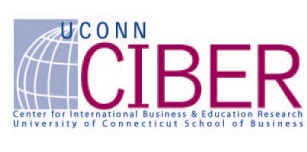CTPost.com – Connecticut employers added 11,500 jobs in September, the biggest single-month gain in more than two decades, a report released Monday by the Connecticut Department of Labor showed.
Department News
Articles about activities within the academic departments
A Textbook Model of Dividend Predictability
Seeking Alpha – It stands to reason that a value investor should examine any potential investment based upon ALL metrics, especially the methods that are the most meaningful for dividend investors. The simplest model for valuing equity is the dividend discount model – the value of a stock is the present value of expected dividends on it.
Research Seminar with Junhong Chu
Professor Ju nhong Chu from the National University of Singapore gave a research seminar on Friday, October 10 about “quantifying cross-network effects in online C2C platforms.” This research examines the phenomenal growth of Taobao.com, a key reason behind the largest-ever IPO by Alibaba Group in September. Taobao.com is an eBay-like consumer-to-consumer platform. Professor Chu’s analysis suggests a significant cross-network effect on both sides of the market: buyers and sellers. The installed base of either side of the platform has propelled the growth of the other side. However, the installed base of sellers has a much larger effect on the growth of buyers than vice versa. In light of the results in this study, Taobao.com has changed some of its policies to become more “seller friendly.”
nhong Chu from the National University of Singapore gave a research seminar on Friday, October 10 about “quantifying cross-network effects in online C2C platforms.” This research examines the phenomenal growth of Taobao.com, a key reason behind the largest-ever IPO by Alibaba Group in September. Taobao.com is an eBay-like consumer-to-consumer platform. Professor Chu’s analysis suggests a significant cross-network effect on both sides of the market: buyers and sellers. The installed base of either side of the platform has propelled the growth of the other side. However, the installed base of sellers has a much larger effect on the growth of buyers than vice versa. In light of the results in this study, Taobao.com has changed some of its policies to become more “seller friendly.”
Junhong Chu is an associate professor of marketing at the National University of Singapore Business School. She earned a Ph.D. in marketing and an MBA from the University of Chicago, Booth School of Business. Her research interests include structural modeling of consumer and firm behavior, two-sided markets, distribution channels, e-commerce, and retailing. Her research has appeared in Marketing Science, Journal of Marketing Research, Journal of Marketing, and International Journal of Research in Marketing. She was a 2011 MSI Young Scholar.
Carstensen Releases Final Report on Downtown North
Hartford Courant– UConn Economist Fred Carstensen, who was hired by the Hartford City Council to do analysis on the proposed downtown north development, has submitted his final report to the council.
School of Business Awarded $1.1M CIBER Grant To Focus on Manufacturing & Global Opportunities
The University of Connecticut School of Business has been awarded a four-year U.S. Department of Education CIBER grant in excess of $1.1 million, to produce a series of programs and partnerships that center around manufacturing.

The CIBER—Center for International Business Education and Research—award comes following an extremely competitive application process in which only half of applicants had their awards renewed.Continue Reading
Marketing Professor Kevin McEvoy Talks Synchrony’s New Ad Campaign
Business Week Recognizes UConn Business Law Program as “Top Ten”
Business Week named the UConn Business Law program among the top ten undergraduate programs in the U.S. This ranking is based on survey responses from graduating seniors regarding their learning experiences in Business Law classes. Members of the Business Law faculty have repeatedly earned national recognition from their peers for their teaching methods and classroom mastery. Continue Reading
Frank Guardi: 2014 Graduate Accepts Digital Marketing Job

Frank Guardi is a ’14 UConn graduate with a communication major and a business fundamentals minor. Guardi has accepted a position in IBM’s Marketing and Communication Department as a social business and social media specialist. His job responsibilities include monitoring social conversations, managing user communities, and social media platforms such as corporate blogs, Facebook, and Twitter, and designing and implementing social media campaigns.
With a focus on digital marketing and social media, Frank enrolled in Professor Jane Gu’s Digital Marketing class, and found the class very helpful in preparing for his planned career. As part of the class, Guardi learned how to conduct social monitoring and search engine optimization (SEO) as well as important social media frameworks such as the “engagement pyramid.” Taking the class got him up to date with the digital marketing activities of major companies, such as Google and Amazon. For his class project, Frank worked with five other students to develop an integrated digital marketing plan to market Cape Cod potato chips to the west coast.
As a student, Guardi worked to build his digital marketing credentials and interned with an MLB baseball team to manage its social media campaigns and with IBM’s external relations department. Guardi’s advice to students is to “start an internship early in their junior year or before entering senior year in the area or company they are interested in, and to start planning to job-hunt once they begin their senior year. The market is becoming more and more competitive. You have to get ready early.”
Guardi, a student athlete, is a member of the UConn football team. He admits, “Spending forty hours in training and maintaining a good GPA at the same time is not easy.” Nonetheless, this experience has sharpened his capabilities in time management, teamwork, social skills, and commitment, qualities that employers highly desire.
Guardi relocated to Austin, Texas for his new job in late May. “It is a fun city with a lot going on,” Guardi smiled. “I expect to stay active.”
Networking Reception Draws Students and Alumni
by Rachel Miller ’14

NETWORKING. As a senior marketing major, this is a word I have become very familiar with over the past four years. Like other business majors, we are told that networking is one of the most valuable skills for business success. However, many times it is difficult to practice and become a “skilled networker” as a student. On February 10th, at the Alumni and Student Networking Reception, the Marketing Department provided students the opportunity to improve their networking skills.
Despite relentless winter weather, the event was a success, and the Wilbur Cross library was filled with marketing students and faculty members. Keynote speaker John Fodor, a UConn alum and the Executive Vice President of Sales & Distribution for the Capital Group/American Fund, related how he used his business skills to quickly come up with a new family vacation after his family’s Caribbean flights were cancelled by an erupting volcano. Many of us are familiar with the stress of planning family vacations, and he used this relatable topic as a platform to highlight the importance of being prepared with a “plan B,” whether it is for a family vacation or a business deal.
At a large university like UConn, it can sometimes be difficult and intimidating for students to talk to alumni and faculty one-to-one. However, these networking events are one of the best ways to transfer what we learn in the classroom to the “real world.” These networking events transform “networking” from a familiar term to a practiced skill.
Click here to see more photos from the event.
How to Navigate the Five Pathways of Corporate Legal Strategy
MIT Sloan Management Review (forthcoming)
Robert Bird. Co-author: David Orozco
CEOs, board members and executives are forced to navigate increased regulation, lawsuits, varying international legal regimes, and the greater prospect of liability due to stiffer legal penalties. Top executives recognize that legal capabilities are a necessary element of long-term corporate success. A Financial Times study found that 24 percent of U.S. companies had lawyer-directors in 2000, and in 2009 that amount notably increased to 43 percent. Corporations generate tangible returns, such as higher stock market valuations, when they employ attorneys who serve as board members, and when top corporate officers have legal knowledge.
Paradoxically, the processes through which corporate legal departments provide competitive advantage remain poorly understood. The law is all too often viewed as a constraint on managerial decisions and is often perceived by executives as a source of costs. This prevailing cost perspective towards the law, while valuable, does not explain how leading companies employ their legal departments to secure long-term competitive advantage for the firm.
Robert Bird and his co-authors explain how viewing the law narrowly as a cost or compliance issue inevitably leads to foregone strategic opportunities, and introduce an actionable framework, the Five Pathways of Corporate Legal Strategy: avoidance, compliance, prevention, value, and transformation. These pathways should enable managers to think about the law strategically and identify value-creating opportunities, thereby creating long-term and sustainable value. Legal rules are not just a checklists to complete, but an opportunity to advance firm goals in a competitive business environment.